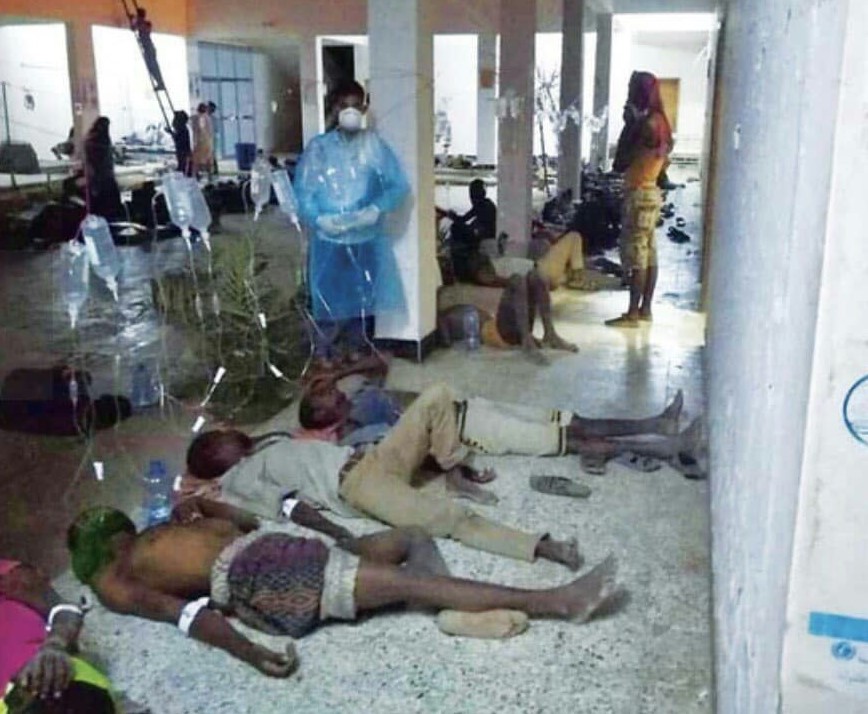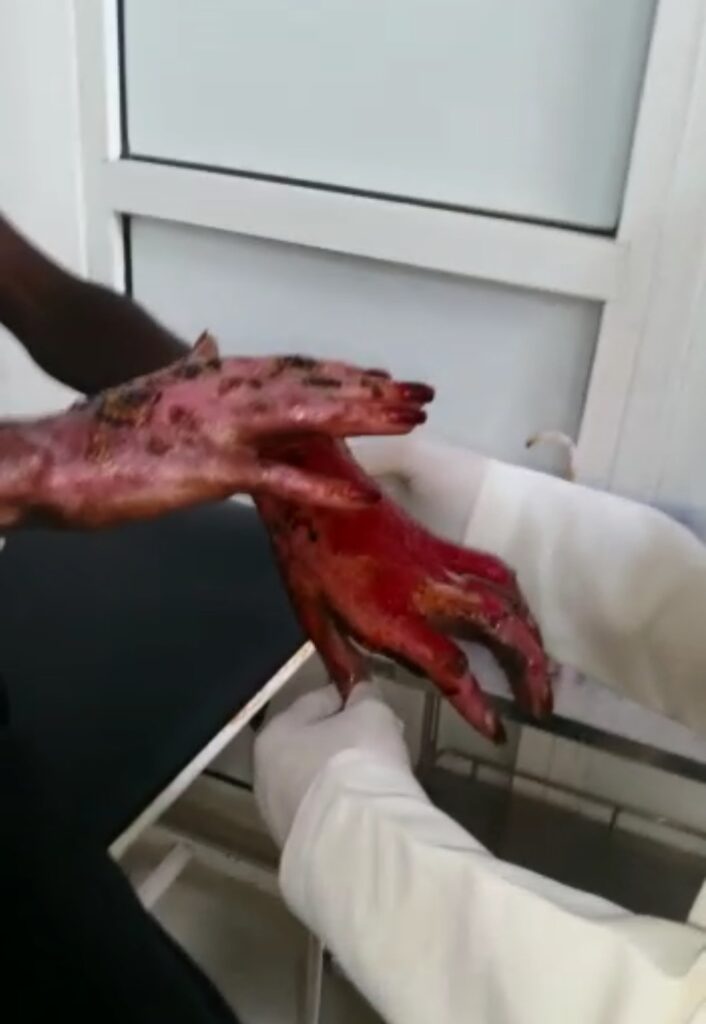This is the second in a series of articles that will cover the stories of survivors of the March bombing, and the traumas faced by Oromo migrants and asylum seekers in Yemen more generally. OLLAA’s goal is to bring attention to this largely unknown and uncovered humanitarian disaster.
To read the first article in the series, click here.
**Warning: this article contains disturbing content and images**

The Houthi bombing that occurred in March of last year, resulting in the death of at least 400 Oromo migrants, exposes the horror that can await some of the most vulnerable individuals in an already devastated region. As we edge closer to the one year anniversary of the tragedy, it is worth taking stock of the current situation in Yemen – and what it portends for those who remain stranded there.
The ongoing conflict in Yemen is one of the most tragic and enduring humanitarian crises in recent years. The profound suffering of millions of Yemenis paints a clear picture of the terrible consequences of war and the catastrophic human toll it occurs. But for those that already occupy some of the most marginalized segments of our societies – refugees and migrants – life in Yemen is untenable.
Yemen on the Brink
According to the UNHCR, the humanitarian crisis in Yemen represents a:
“tragic convergence of four threats: a violent and protracted conflict, economic devastation, social services on the brink of collapse, including health, nutrition, water sanitation, education, protection; and a critically underfunded UN system”.
Less than 50% of health facilities in Yemen are currently functional, and even those that are lack many basic medicines, equipment and specialists. According to a policy brief by the World Bank, human development in Yemen has gone back by 20 years since the onset of the conflict.
In 2021, the IOM called for USD 170 million “to meet the increasing needs of displaced, conflict-affected and migrant communities in Yemen.” However, as of September, 2021, only half of those funds had been raised. This forces organizations like the IOM to drastically reduce their operations, despite there being some 32,000 migrants currently stranded in Yemen (the vast majority of whom are Ethiopian) at high risk of exploitation and abuse.
For the survivors of the March bombing, the perils are twofold. Not only are they in a precarious situation, where, in particular, migrants are unable to access help from the UNHCR as they do not fall within their mandate (which only covers asylum seekers and refugees), the Yemen health system is already at risk of collapse. With very few humanitarian organizations currently operating in Yemen, and facing a strong history of hostility towards Ethiopians in Yemen, the options for accessing help are extremely limited.
In addition to the more in depth testimonies we have compiled from survivors, OLLAA has received a list of 38 survivors of the Houthi bombing. While it has been impossible to verify the claims made, due to the difficulty of collecting data and the security concerns of our contacts on the ground, our witness alleges that these individuals have not received humanitarian or medical assistance since the incident. Even for those that do, like our previous cases, Sultan and Faisal, treatment is often inadequate and ends abruptly – despite serious ongoing medical needs.
Even for migrants who make the decision to return to Ethiopia, as has been encouraged by an IOM program helping migrants to voluntarily return, it is no easy solution. A lack of support services and resources mean that returning often does not meaningfully improve their situation. And, according to an ILO report on returnees, their socio-economic conditions typically deteriorate post-return compared to pre-migration.
The 2021 UNOCHA Humanitarian Needs report states:
“Of the more than 44,466 migrants who returned to Ethiopia between April and December 2020, many suffer from psychological and physical trauma from experiences of physical abuse, sleep deprivation, illegal detention, forced labor and wage theft and need urgent mental health and psychological support.”
In this second article of our series, we tell the story of Takumma, another young man who bears the scars of the March bombing, and who has since returned to Ethiopia via the IOM. We urge the international community to view these stories as a call to action to do more to relieve the devastating humanitarian suffering affecting all those in conflict-affected zones such as Yemen and Ethiopia.
The Story of Takumma
The following image of Takumma does not show his face, instead it is his hands that bear witness to the ordeal he has been put through. One hand shows the pale pink of scar tissue, with aging scabs still visible on the surface. The other is a much more fiery red, as though the heat of the fire that marked them has never gone away. It is clear that the pain must be excruciating, and, with both hands so damaged by third degree burns, it is apparent that Takumma cannot work or do many basic tasks in his current condition.

What the photo doesn’t reveal is that Takumma is just 20 years old. He was born in the Harar region of Ethiopia and arrived in Yemen in October of 2019. Like most young people his age, he dreamt of better prospects – a job that paid a living wage, a future full of possibilities.
Instead, the journey that left him without the full use of his hands has now come to an end. Months after the bombing, and still in a serious condition, Takumma was repatriated by the International Organization for Migration (IOM), with promises that he would receive treatment once he was back in Ethiopia (although this treatment has yet to materialize).
As recently reported by Ryerson University, returning migrants to Ethiopia, such as Takumma, face triple vulnerabilities. Not only have they been returned to the country under forceful circumstances (where even if voluntary, the nature of the circumstances facing them, such as Takumma’s dire medical situation, have not left them much choice), but they are also returning to conflict-affected areas. All while in the midst of a COVID-19 pandemic. With Ethiopia witnessing its own humanitarian disaster, the needs of such vulnerable returning migrants is often relegated to the bottom of the ever-growing list of those in desperate need of help.
On top of this, as author Girmachew Adugna writes:
“The indifference and negligible commitment of governments at both origin and destination exacerbates human rights violations against migrants, including physical and sexual maltreatment, denial of basic freedoms, denial of salary, sleep deprivation, the withholding of passports, confinement, and murder.”
Takumma, like Sultan and Faisal, reports experiencing physical abuse and torture during his stay at the passport migrantion detention centre in Sadna’a.
Ensuring that returning migrants are able to access services and support, particularly when they have experienced signficant trauma, including torture and physical abuse, is essential – but sadly rare. According to Adugna, “only a small proportion have received reintegration support of some kind”, noting that this “is not satisfactory at all.”
Conclusions
Takumma’s story shows us how the deep trauma faced by those pursuing a better life is typically overlooked and ignored by governments, leaving vulnerable victims of abuse and exploitation to face situations where the odds are progressively stacked against them.
OLLAA urges the international community, as well as the Yemeni and Ethiopian governments, to pay more attention to the plights of migrants and refugees and ensure that they are given access to the support services they so desperately need.
According to UNOCHA, “By September [2021], some 584,000 people were in catastrophic levels of hunger in four countries: Ethiopia, northern Madagascar, South Sudan and Yemen.” It is clear that for Ethiopian migrants and refugees in Yemen, wedged between two catastrophic disasters, much more needs to be done to ensure their human dignity and human rights are upheld.
** OLLAA acknowledges the Saudi-led airstrike on a migrant detention centre in Saada on Friday January 21, 2022, which occurred prior to the writing of this article. We express our deepest sympathies to all victims of the attack and their families. OLLAA urges the international community to condemn this attack and hold the perpetrators to account. Our press release can be found here.
Per survivors’ request for assistance with their medical expenses, we humbly ask you to support them directly HERE
We express our deep gratitude to Arafat Jibreel and Fayissa Baye for all their hard work bringing these testimonies to OLLAA.

